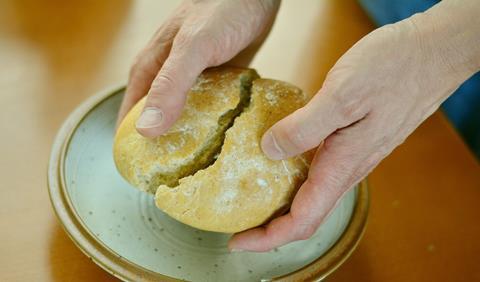The Methodist Church has overwhelmingly voted to overturn its ban on online communion. Dr Pete Phillips, who believes online church is just as ‘real’ as meeting in buildings, and has pioneered the term ‘hybrid church’, welcomes the news

At the beginning of the pandemic, the United Methodist Church, URC and many other traditions all adopted online communion. But three large denominations refused – the Catholic Church, The Church of England and The Methodist Church.
However, on Tuesday, delegates at The Methodist Church’s annual conference voted to overturn that ban, with 217 votes in favour and 65 against.
The core document around the Lord’s Supper for Methodists is a 2003 report called ’His Presence Makes the Feast’ and it reflects a relatively high sense of what the Communion Service is about. It is not just a memorial of the Last Supper, or of Christ’s sacrificial death. Methodists believe in the real presence of Jesus at the heart of the Eucharist, not so much in terms of the bread and wine turning into his body and blood but much more richly in the real presence of Christ at the heart of communion. We eat the bread, drink the juice of the grape as a reminder of his body given for us, his blood shed for us. Back in 2018, the Conference decided such a belief demanded the real presence of Christ amongst a congregation gathered in a building.
But during the pandemic as online worship has become the norm, we have realised that people can be connected together online.
Online worship is a gathering together of the body of Christ. When people are sat on their couches in their living rooms or on Zoom they are not avatars, they are real embodied people. People like me were wondering, so why then do we not allow the embodied people of God gathered for worship to take bread and wine?
Another important reason why the ban has been overturned relates to inclusion. Just as online church opens up church to those excluded, so online communion is a deeply inclusive measure – it opens up the table of the Lord to even more people to experience the grace of God. If we do not permit online communion then many disabled people, those who are unable to get to onsite church for any reason, perhaps work commitments, caring for relatives, their mental health etc, are prevented from partaking. Communion is also about including the whole body of Christ across time and space. As the new report itself puts it: “Online Holy Communion may be a particularly appropriate opportunity to celebrate that the congregation is united in Christ by the power of the Holy Spirit both with each other and with the universal Church.” (Report on Online Communion, 2021, 4.15).
There is much to commend in the report – not least the fantastic section on digital anthropology (Section 5) which notes issues of embodiment online raised above and questions what people mean when they say that meeting digitally isn’t real. In the end, the proposal was made to have a three year period of discernment during which online communion (with a synchronous online congregation) should be explored.
Inclusive, innovative, imaginative – just some of the words used to describe this move. Of course, some disagreed – a reservation about embodiedness, a hesitation about putting experience about theology, a concern that the rush online railroaded a decision some disagree with. But a sense overall that this move is good not just for the pandemic but for the future direction of church. Occasionally, both in the report and the debate, the term “hybrid church” was used. A term pioneered by myself and now part of Premier’s Hybrid Church Charter.
Exciting times then for the Methodist Church. From 1st September, a whole six weeks after lockdown looks likely to have been eased completely, we will be able to celebrate the breaking of bread and wine with congregations gathered online. Some will be asking why it took a pandemic to move the Church into the 21st Century!





































